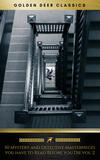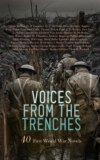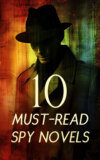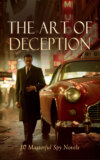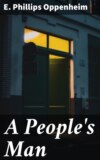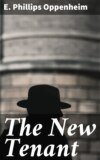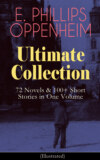Buch lesen: «Anna the Adventuress», Seite 7
Chapter XV
A MARRIAGE CERTIFICATE
Anna looked about her admiringly. It was just such a bedroom as she would have chosen for herself. The colouring was green and white, with softly shaded electric lights, an alcove bedstead, which was a miracle of daintiness, white furniture, and a long low dressing-table littered all over with a multitude of daintily fashioned toilet appliances. Through an open door was a glimpse of the bathroom – a vision of luxury, out of which Annabel herself, in a wonderful dressing-gown and followed by a maid presently appeared.
“Too bad to keep you waiting,” Annabel exclaimed. “I’m really very sorry. Collins, you can go now. I will ring if I want you.”
The maid discreetly withdrew, and Anna stood transfixed, gazing with puzzled frown at her sister.
“Annabel! Why, what on earth have you been doing to yourself, child?” she exclaimed.
Annabel laughed a little uneasily.
“The very question, my dear sister,” she said, “tells me that I have succeeded. Dear me, what a difference it has made! No one would ever think that we were sisters. Don’t you think that the shade of my hair is lovely?”
“There is nothing particular the matter with the shade,” Anna answered, “but it is not nearly so becoming as before you touched it. And what on earth do you want to darken your eyebrows and use so much make-up for at your age? You’re exactly twenty-three, and you’re got up as much as a woman of forty-five.”
Annabel shrugged her shoulders.
“I only use the weeniest little dab of rouge,” she declared, “and it is really necessary, because I want to get rid of the ‘pallor effect.’”
Anna made no remark. Her disapproval was obvious enough. Annabel saw it, and suddenly changed her tone.
“You are very stupid, Anna,” she said. “Can you not understand? It is of no use your taking my identity and all the burden of my iniquities upon your dear shoulders if I am to be recognized the moment I show my face in London. That is why I have dyed my hair, that is why I have abandoned my rôle of ingenuèe and altered my whole style of dress. Upon my word, Anna,” she declared, with a strange little laugh, “you are a thousand times more like me as I was two months ago than I am myself.”
A sudden sense of the gravity of this thing came home to Anna. Her sister’s words were true. They had changed identities absolutely. It was not for a week or a month. It was for ever. A cold shiver came over her. That last year in Paris, when Annabel and she had lived in different worlds, had often been a nightmare to her. Annabel had taken her life into her hands with gay insouciance, had made her own friends, gone her own way. Anna never knew whither it had led her – sometimes she had fears. It was her past now, not Annabel’s.
“It is very good of you to come and see me, my dear sister,” Annabel remarked, throwing herself into a low chair, and clasping her hands over her head. “To tell you the truth, I am a little dull.”
“Where is your husband?” Anna asked.
“He is addressing a meeting of his constituents somewhere,” Annabel answered. “I do not suppose he will be home till late. Tell me how are you amusing yourself?”
Anna laughed.
“I have been amusing myself up to now by trying to earn my living,” she replied.
“I hope,” Annabel answered lazily, “that you have succeeded. By-the-bye, do you want any money? Sir John’s ideas of pin money are not exactly princely, but I can manage what you want, I dare say.”
“Thank you,” Anna answered coldly. “I am not in need of any. I might add that in any case I should not touch Sir John’s.”
“That’s rather a pity,” Annabel said. “He wants to settle something on you, I believe. It is really amusing. He lives in constant dread of a reappearance of ‘La Belle Alcide,’ and hearing it said that she is his wife’s sister. Bit priggish, isn’t it? And if he only knew it – so absurd. Tell me how you are earning your living here, Anna – typewriting, or painting, or lady’s companion?”
“I think,” Anna said, “that the less you know about me the better. Is all your house on the same scale of magnificence as this, Annabel?” she asked, looking round.
Annabel shook her head.
“Most of it is ugly and frowsy,” she declared, “but it isn’t worth talking about. I have made up my mind to insist upon moving from here into Park Lane, or one of the Squares. It is absolutely a frightful neighbourhood, this. If only you could see the people who have been to call on me! Sir John has the most absurd ideas, too. He won’t have menservants inside the house, and his collection of carriages is only fit for a museum – where most of his friends ought to be, by-the-bye. I can assure you, Anna, it will take me years to get decently established. The man’s as obstinate as a mule.”
Anna looked at her steadily.
“He will find it difficult no doubt to alter his style of living,” she said. “I do not blame him. I hope you will always remember – ”
Annabel held out her hands with a little cry of protest.
“No lecturing, Anna!” she exclaimed. “I hope you have not come for that.”
“I came,” Anna answered, looking her sister steadily in the face, “to hear all that you can tell me about a man named Hill.”
Annabel had been lying curled up on the lounge, the personification of graceful animal ease. At Anna’s words she seemed suddenly to stiffen. Her softly intertwined fingers became rigid. The little spot of rouge was vivid enough now by reason of this new pallor, which seemed to draw the colour even from her lips. But she did not speak. She made no attempt to answer her sister’s question. Anna looked at her curiously, and with sinking heart.
“You must answer me, Annabel,” she continued. “You must tell me the truth, please. It is necessary.”
Annabel rose slowly to her feet, walked to the door as though to see that it was shut, and came back with slow lagging footsteps.
“There was a man called Montague Hill,” she said hoarsely, “but he is dead.”
“Then there is also,” Anna remarked, “a Montague Hill who is very much alive. Not only that, but he is here in London. I have just come from him.”
Annabel no longer attempted to conceal her emotion. She battled with a deadly faintness, and she tottered rather than walked back to her seat. Anna, quitting her chair, dropped on her knees by her sister’s side and took her hand.
“Do not be frightened, dear,” she said. “You must tell me the truth, and I will see that no harm comes to you.”
“The only Montague Hill I ever knew,” Annabel said slowly, “is dead. I know he is dead. I saw him lying on the footway. I felt his heart. It had ceased to beat. It was a motor accident – a fatal motor accident the evening papers called it. They could not have called it a fatal motor accident if he had not been dead.”
Anna nodded.
“Yes, I remember,” she said. “It was the night you left Paris. They thought that he was dead at first, and they took him to the hospital. I believe that his recovery was considered almost miraculous.”
“Alive,” Annabel moaned, her eyes large with terror. “You say that he is alive.”
“He is certainly alive,” Anna declared. “More than that, he arrived to-day at the boarding-house where I am staying, greeted me with a theatrical start, and claimed me – as his wife. That is why I am here. You must tell me what it all means.”
“And you?” Annabel exclaimed. “What did you say?”
“Well, I considered myself justified in denying it,” Anna answered drily. “He produced what he called a marriage certificate, and I believe that nearly every one in the boarding-house, including Mrs. White, my landlady, believes his story. I am fairly well hardened in iniquity – your iniquity, Annabel – but I decline to have a husband thrust upon me. I really cannot have anything to do with Mr. Montague Hill.”
“A – marriage certificate!” Annabel gasped.
Anna glanced into her sister’s face, and rose to her feet.
“Let me get you some water, Annabel. Don’t be frightened, dear. Remember – ”
Annabel clutched her sister’s arm. She would not let her move. She seemed smitten with a paroxysm of fear.
“A thick-set, coarse-looking young man, Anna!” she exclaimed in a hoarse excited whisper. “He has a stubbly yellow moustache, weak eyes, and great horrid hands.”
Anna nodded.
“It is the same man, Annabel,” she said. “There is no doubt whatever about that. There was the motor accident, too. It is the same man, for he raved in the hospital, and they fetched me. It was you, of course, whom he wanted.”
“Alive! In London!” Annabel moaned.
“Yes. Pull yourself together, Annabel! I must have the truth.”
The girl on the lounge drew a long sobbing breath.
“You shall,” she said. “Listen! There was a Meysey Hill in Paris, an American railway millionaire. This man and he were alike, and about the same age. Montague Hill was taken for the millionaire once or twice, and I suppose it flattered his vanity. At any rate, he began to deliberately personate him. He sent me flowers. Celeste introduced him to me – oh, how Celeste hated me! She must have known. He – wanted to marry me. Just then – I was nervous. I had gone further than I meant to – with some Englishmen. I was afraid of being talked about. You don’t know, Anna, but when one is in danger one realizes that the – the other side of the line is Hell. The man was mad to marry me. I heard everywhere of his enormous riches and his generosity. I consented. We went to the Embassy. There was – a service. Then he took me out to Monteaux, on a motor. We were to have breakfast there and return in the evening. On the way he confessed. He was a London man of business, spending a small legacy in Paris. He had heard me sing – the fool thought himself in love with me. Celeste he knew. She was chaffing him about being taken for Meysey Hill, and suggested that he should be presented to me as the millionaire. He told me with a coarse nervous laugh. I was his wife. We were to live in some wretched London suburb. His salary was a few paltry hundreds a year. Anna, I listened to all that he had to say, and I called to him to let me get out. He laughed. I tried to jump, but he increased the speed. We were going at a mad pace. I struck him across the mouth, and across the eyes. He lost control of the machine. I jumped then – I was not even shaken. I saw the motor dashed to pieces against the wall, and I saw him pitched on his head into the road. I leaned over and looked at him – he was quite still. I could not hear his heart beat. I thought that he was dead. I stole away and walked to the railway station. That night in Paris I saw on the bills ‘Fatal Motor Accidents.’ Le Petit Journal said that the man was dead. I was afraid that I might be called upon as a witness. That is why I was so anxious to leave Paris. The man who came to our rooms, you know, that night was his friend.”
“The good God!” Anna murmured, herself shaken with fear. “You were married to him!”
“It could not be legal,” Annabel moaned. “It couldn’t be. I thought that I was marrying Meysey Hill, not that creature. We stepped from the Embassy into the motor – and oh! I thought that he was dead. Why didn’t he die?”
Anna sprang to her feet and walked restlessly up and down the room. Annabel watched her with wide-open, terrified eyes.
“You won’t give me away, Anna. He would never recognize me now. You are much more like what I was then.”
Anna stopped in front of her.
“You don’t propose, do you,” she said quietly, “that I should take this man for my husband?”
“You can drive him away,” Annabel cried. “Tell him that he is mad. Go and live somewhere else.”
“In his present mood,” Anna remarked, “he would follow me.”
“Oh, you are strong and brave,” Annabel murmured. “You can keep him at arm’s length. Besides, it was under false pretences. He told me that he was a millionaire. It could not be a legal marriage.”
“I am very much afraid,” Anna answered, “that it was. It might be upset. I am wondering whether it would not be better to tell your husband everything. You will never be happy with this hanging over you.”
Annabel moistened her dry lips with a handkerchief steeped in eau de Cologne.
“You don’t know him, Anna,” she said with a little shudder, “or you would not talk like that. He is steeped in the conventions. Every slight action is influenced by what he imagines would be the opinion of other people. Anything in the least irregular is like poison to him. He has no imagination, no real generosity. You might tell the truth to some men, but never to him.”
Anna was thoughtful. A conviction that her sister’s words were true had from the first possessed her.
“Annabel,” she said slowly, “if I fight this thing out myself, can I trust you that it will not be a vain sacrifice? After what you have said it is useless for us to play with words. You do not love your husband, you have married him for a position – to escape from – things which you feared. Will you be a faithful and honest wife? Will you do your duty by him, and forget all your past follies? Unless, Annabel, you can – ”
“Oh, I will pledge you my word,” Annabel cried passionately, “my solemn word. Believe me, Anna. Oh, you must believe me. I have been very foolish, but it is over.”
“Remember that you are young still, and fond of admiration,” Anna said. “You will not give Sir John any cause for jealousy? You will have no secrets from him except – concerning those things which are past?”
“Anna, I swear it!” her sister sobbed.
“Then I will do what I can,” Anna promised. “I believe that you are quite safe. He has had brain fever since, and, as you say, I am more like what you were then than you yourself are now. I don’t think for a moment that he would recognize you.”
Annabel clutched her sister’s hands. The tears were streaming down her face, her voice was thick with sobs.
“Anna, you are the dearest, bravest sister in the world,” she cried. “Oh, I can’t thank you. You dear, dear girl. I – listen.”
They heard a man’s voice outside.
“Sir John!” Annabel gasped.
Anna sprang to her feet and made for the dressing-room door.
“One moment, if you please!”
She stopped short and looked round. Sir John stood upon the threshold.
Chapter XVI
THE DISCOMFITURE OF SIR JOHN
Sir John looked from one to the other of the two sisters. His face darkened.
“My arrival appears to be opportune,” he said stiffly. “I was hoping to be able to secure a few minutes’ conversation with you, Miss Pellissier. Perhaps my wife has already prepared you for what I wish to say.”
“Not in the least,” Anna answered calmly. “We have scarcely mentioned your name.”
Sir John coughed. He looked at Annabel, whose face was buried in her hands – he looked back at Anna, who was regarding him with an easy composure which secretly irritated him.
“It is concerning – our future relations,” Sir John pronounced ponderously.
“Indeed!” Anna answered indifferently. “That sounds interesting.”
Sir John frowned. Anna was unimpressed. Elegant, a little scornful, she leaned slightly against the back of a chair and looked him steadily in the eyes.
“I have no wish,” he said, “to altogether ignore the fact that you are my wife’s sister, and have therefore a certain claim upon me.”
Anna’s eyes opened a little wider, but she said nothing.
“A claim,” he continued, “which I am quite prepared to recognize. It will give me great pleasure to settle an annuity for a moderate amount upon you on certain conditions.”
“A – what?” Anna asked.
“An annuity – a sum of money paid to you yearly or quarterly through my solicitors, and which you can consider as a gift from your sister. The conditions are such as I think you will recognize the justice of. I wish to prevent a repetition of any such errand as I presume you have come here upon this evening. I cannot have my wife distressed or worried.”
“May I ask,” Anna said softly, “what you presume to have been the nature of my errand here this evening?”
Sir John pointed to Annabel, who was as yet utterly limp.
“I cannot but conclude,” he said, “that your errand involved the recital to my wife of some trouble in which you find yourself. I should like to add that if a certain amount is needed to set you free from any debts you may have contracted, in addition to this annuity, you will not find me unreasonable.”
Anna glanced momentarily towards her sister, but Annabel neither spoke nor moved.
“With regard to the conditions I mentioned,” Sir John continued, gaining a little confidence from Anna’s silence, “I think you will admit that they are not wholly unreasonable. I should require you to accept no employment whatever upon the stage, and to remain out of England.”
Anna’s demeanour was still imperturbable, her marble pallor untinged by the slightest flush of colour. She regarded him coldly, as though wondering whether he had anything further to say. Sir John hesitated, and then continued.
“I trust,” he said, “that you will recognize the justice of these conditions. Under happier circumstances nothing would have given me more pleasure than to have offered you a home with your sister. You yourself, I am sure, recognize how impossible you have made it for me now to do anything of the sort. I may say that the amount of the annuity I propose to allow you is two hundred a year.”
Anna looked for a moment steadily at her sister, whose face was still averted. Then she moved towards the door. Before she passed out she turned and faced Sir John. The impassivity of her features changed at last. Her eyes were lit with mirth, the corners of her mouth quivered.
“Really, Sir John,” she said, “I don’t know how to thank you. I can understand now these newspapers when they talk of your magnificent philanthropy. It is magnificent indeed. And yet – you millionaires should really, I think, cultivate the art of discrimination. I am so much obliged to you for your projected benevolence. Frankly, it is the funniest thing which has ever happened to me in my life. I shall like to think of it – whenever I feel dull. Good-bye, Anna!”
Annabel sprang up. Sir John waved her back.
“Do I understand you then to refuse my offer?” he asked Anna.
She shot a sudden glance at him. Sir John felt hot and furious. It was maddening to be made to feel that he was in any way the inferior of this cool, self-possessed young woman, whose eyes seemed for a moment to scintillate with scorn. There were one or two bitter moments in his life when he had been made to feel that gentility laid on with a brush may sometimes crack and show weak places – that deportment and breeding are after all things apart. Anna went out.
Her cheeks burned for a moment or two when she reached the street, although she held her head upright and walked blithely, even humming to herself fragments of an old French song. And then at the street corner she came face to face with Nigel Ennison.
“I won’t pretend,” he said, “that this is an accident. The fates are never so kind to me. As a matter of fact I have been waiting for you.”
She raised her eyebrows.
“Really,” she said. “And by what right do you do anything of the sort?”
“No right at all,” he admitted. “Only it is much too late for you to be out alone. You have been to see your sister, of course. How is she?”
“My sister is quite well, thank you,” she answered. “Would you mind calling that hansom for me?”
He looked at it critically and shook his head.
“You really couldn’t ride in it,” he said, deprecatingly. “The horse’s knees are broken, and I am not sure that the man is sober. I would sooner see you in a ’bus again.”
She laughed.
“Do you mean to say that you have been here ever since I came?”
“I am afraid that I must confess it,” he answered. “Idiotic, isn’t it?”
“Absolutely,” she agreed coldly. “I wish you would not do it.”
“Would not do what?”
“Well, follow buses from Russell Square to Hampstead.”
“I can assure you,” he answered, “that it isn’t a habit of mine. But seriously – ”
“Well seriously?”
“Isn’t it your own fault a little? Why do you not tell me your address, and allow me to call upon you.”
“Why should I? I have told you that I do not wish for acquaintances in London.”
“Perhaps not in a general way,” he answered calmly. “You are quite right, I think. Only I am not an acquaintance at all. I am an old friend, and I declined to be shelved.”
“Would you mind telling me,” Anna asked, “how long I knew you in Paris?”
He looked at her sideways. There was nothing to be learned from her face.
“Well,” he said slowly, “I had met you three times – before Drummond’s dinner.”
“Oh, Drummond’s dinner!” she repeated. “You were there, were you?”
He laughed a little impatiently.
“Isn’t that rather a strange question – under the circumstances?” he asked quietly.
Her cheeks flushed a dull red. She felt that there was a hidden meaning under his words. Yet her embarrassment was only a passing thing. She dismissed the whole subject with a little shrug of the shoulders.
“We are both of us trenching upon forbidden ground,” she said. “It was perhaps my fault. You have not forgotten – ”
“I have forgotten nothing?” he answered, enigmatically.
Anna hailed a bus. He looked at her reproachfully. The bus however was full. They fell into step again. More than ever a sense of confusion was upon Ennison.
“Last time I saw you,” he reminded her, “you spoke, did you not, of obtaining some employment in London.”
“Quite true,” she answered briskly, “and thanks to you I have succeeded.”
“Thanks to me,” he repeated, puzzled. “I don’t understand.”
“No? But it is very simple. It was you who were so much amazed that I did not try – the music hall stage here.”
“You must admit,” he declared, “that to us – who had seen you – the thought of your trying anything else was amazing.”
“At any rate,” she declared, “your remarks decided me. I have an engagement with a theatrical agent – I believe for the ‘Unusual’.”
“You are going to sing in London?” he said quietly.
“Yes.”
For a moment or two he did not speak. Glancing towards him she saw that a shadow had fallen upon his face.
“Tell me,” she insisted, “why you look like that. You are afraid – that here in London – I shall not be a success. It is that, is it not?”
“No,” he answered readily. “It is not that. The idea of your being a failure would never have occurred to me.”
“Then why are you sorry that I am going to the ‘Unusual’? I do not understand.”
Their eyes met for a moment. His face was very serious.
“I am sorry,” he said slowly. “Why, I do not know.”
“I positively insist upon knowing,” she declared cheerfully. “The sooner you tell me the better.”
“It is very hard to explain,” he answered. “I think that it is only an idea. Only you seem to me since the time when I knew you in Paris to have changed – to have changed in some subtle manner which I find at times utterly bewildering. I find you an impenetrable enigma. I find it impossible to associate you with – my little friend of the ‘Ambassador’s.’ The things she said and did from you – seem impossible. I had a sort of idea,” he went on, “that you were starting life all over again, and it seemed awfully plucky.”
There was a long silence. Then Anna spoke more seriously than usual.
“I think,” she said, “that I rather like what you have said. Don’t be afraid to go on thinking it. Even though I am going to sing at the ‘Unusual’ you may find that the ‘Alcide,’ whom you knew in Paris does not exist any more. At the same time,” she added, in a suddenly altered tone, “it isn’t anything whatever to do with you, is it?”
“Why not?” he answered. “You permitted me then to call you my friend. I do not intend to allow you to forget.”
They passed a man who stared at them curiously. Ennison started and looked anxiously at Anna. She was quite unconcerned.
“Did you see who that was?” he asked in a low tone.
“I did not recognize him,” Anna answered. “I supposed that he took off his hat to you.”
“It was Cheveney!” he said slowly.
“Cheveney!” she repeated. “I do not know any one of that name.”
He caught her wrist and turned her face towards him. Her eyes were wide open with amazement.
“Mr. Ennison!”
He released her.
“Good God!” he exclaimed. “Who are you – Annabel Pellissier or her ghost?”
Anna laughed.
“If it is a choice between the two,” she answered, “I must be Annabel Pellissier. I am certainly no ghost.”
“You have her face and figure,” he muttered. “You have even her name. Yet you can look Cheveney in the face and declare that you do not know him. You have changed from the veriest butterfly to a woman – you wear different clothes, you have the air of another world. If you do not help me to read the riddle of yourself, Annabel, I think that very soon I shall be a candidate for the asylum.”
She laughed heartily, and became as suddenly grave.
“So Mr. Cheveney was another Paris friend, was he?” she asked.
“Don’t befool me any more,” he answered, almost roughly. “If any one should know – you should! He was your friend. We were only —les autres.”
“That is quite untrue,” she declared cheerfully. “I certainly knew him no better than you.”
“Then he – and Paris – lied,” Ennison answered.
“That,” she answered, “is far easier to believe. You are too credulous.”
Ennison had things to say, but he looked at her and held his tongue. They turned the last corner, and almost immediately a man who had been standing there turned and struck Ennison a violent blow on the cheek. Ennison reeled, and almost fell. Recovering himself quickly his instinct of self-defence was quicker than his recollection of Anna’s presence. He struck out from the shoulder, and the man measured his length upon the pavement.
Anna sprang lightly away across the street. Brendon and Courtlaw who had been watching for her, met her at the door. She pointed across the road.
“Please go and see that – nothing happens,” she pleaded.
“It is the first moment we have let him out of our sight,” Brendon exclaimed, as he hastened across the street.
Hill sat up on the pavement and mopped the blood from his cheek. Ennison’s signet-ring had cut nearly to the bone.
“What the devil do you mean by coming for me like that?” Ennison exclaimed, glowering down upon him. “Serves you right if I’d cracked your skull.”
Hill looked up at him, an unkempt, rough-looking object, with broken collar, tumbled hair, and the blood slowly dripping from his face.
“What do you mean, hanging round with my wife?” he answered fiercely.
Ennison looked down on him in disgust.
“You silly fool,” he said. “I know nothing about your wife. The young lady I was with is not married at all. Why don’t you make sure before you rush out like that upon a stranger?”
“You were with my wife,” Hill repeated sullenly. “I suppose you’re like the rest of them. Call her Miss Pellissier, eh? I tell you she’s my wife, and I’ve got the certificate in my pocket.”
“I don’t know who you are,” Ennison said quietly, “but you are a thundering liar.”
Hill staggered to his feet and drew a folded paper from his pocket.
“Marriage certificates don’t tell lies, at any rate,” he said. “Just look that through, will you.”
Ennison took the document, tore it half in two without looking at it, and flung it back in Hill’s face. Then he turned on his heel and walked off.













